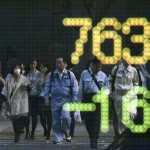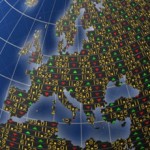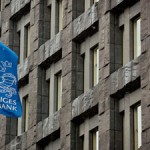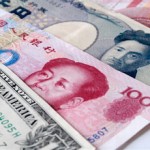European Bonds Gain With Stocks as Aussie, Kiwi Decline

Bonds rose and European stocks gained for a third day on prospects for more stimulus as inflation slows. Brent crude traded near a four-year low before a meeting of oil exporters and currencies from commodity-producing nations weakened.
Spain’s 10-year yield fell four basis points to 1.93 percent at 7:21 a.m. in New York, as rates in countries including Austria and Belgium dropped to records. The Stoxx Europe 600 Index rose 0.4 percent, while Standard & Poor’s 500 Index futures added 0.1 percent after the gauge closed at a record. The Australian and New Zealand dollars slid with Norway’s krone as the yen strengthened versus most of its major peers. Brent was at $80.15 a barrel after tumbling 28 percent this year.
While the European Central Bank won’t make a hasty decision on stimulus, there’s “unanimous agreement that there might be situations where we’d have to do more,” Executive Board member Benoit Coeure said in an interview yesterday. The U.S. economy probably grew at a slower rate than first estimated in the third quarter, while consumer confidence rose to a seven-year high this month, economists said before reports today.
“Low inflation is the key,” said Jan von Gerich, an analyst at Nordea Bank AB in Helsinki. “Clearly people are now expecting even faster action from the ECB. I think we will go a bit lower in yield terms” in European bonds this year, he said.
Euro-area government bonds returned more than 11 percent this year, according to Bloomberg World Bond Indexes, in a rally fueled by increased ECB stimulus that depresses borrowing costs.
‘Low Inflation’
“We are not in deflation, but low inflation is as bad as deflation in terms of the capacity of our economy to grow out of debt,” the ECB’s Coeure said. The discussion in December will be about “weighting the monetary-policy impact of any additional action, in terms of creating liquidity that goes to the right place, and that helps the economy, credit, and the real economy, investment,” he said.
Belgium’s 10-year yield fell as much as three basis points today to a record 1.02 percent, Austria’s touched an all-time low of 0.92 percent and France’s reached 1.083 percent.
Germany’s 10-year yield declined two basis points to 0.76 percent and the rate on similar-maturity Treasury notes also slipped two basis points, to 2.29 percent.
The Australian dollar dropped to a four-year low of 85.26 U.S. cents as central bank Deputy Governor Philip Lowe said the currency is likely to fall further over time.
The kiwi slid 0.9 percent to 77.92 U.S. cents and the krone weakened 0.4 percent to 6.8100 per dollar. The yen strengthened 0.1 percent to 118.09 per dollar.
Banks Gain
An index of banks rose the most among 19 industry groups in the Stoxx 600 today, with trading volumes 11 percent below the 30-day average, according to data compiled by Bloomberg. The index closed at a two-month high yesterday.
HSBC Holdings Plc added 1.3 percent and Societe Generale SA climbed 2.3 percent. Deutsche Bank AG increased 2.5 percent. Banco Santander SA advanced 1.8 percent after the Spanish lender named Jose Antonio Alvarez as its new chief executive officer.
Miners and energy producers led declines, with BHP Billiton Ltd. dropping 1.9 percent and Total SA losing 1.1 percent.
Kingfisher Plc slid 4.4 percent after the home-improvement retailer said sales in France, its largest market, slumped 9.3 percent in the 13 weeks through Nov. 1.
IG Group Holdings Plc gained 3.3 percent after the U.K. spread-betting firm said client activity increased significantly last month.
HP Earnings
Futures (SPX) on the S&P 500 expiring in December were little changed after the index rose for a third day.
Hewlett-Packard Co., Campbell Soup Co. and Tiffany & Co. are among companies releasing earnings. About 79 percent of the S&P 500 companies that have reported earnings this season beat analysts’ estimates for profit, while 60 percent exceeded sales projections, data compiled by Bloomberg show.
Commerce Department data at 8:30 a.m. in Washington may show the U.S. economy expanded at a 3.3 percent annualized rate in the third quarter, compared with an initial reading of 3.5 percent, economists predicted. A Conference Board release at 10 a.m. local time will probably show consumer confidence climbed for a second month.
The MSCI Emerging Markets Index fell for the first time in six days, losing 0.3 percent and falling from a three-week high.
The Hang Seng China Enterprises Index (HSCEI) of mainland companies listed in Hong Kong slipped 0.6 percent after its biggest gain in a year yesterday. The Shanghai Composite Index gained 1.4 percent to a three-year high.
Russia Losses
The Micex fell for a second day and the ruble weakened for the first time in seven days, ending the longest rally in more than a year.
Russia stands to lose as much as $140 billion a year as a result of lower oil prices and U.S. and European sanctions, Finance Minister Anton Siluanov said yesterday.
Stocks in the Gulf region fell, with Abu Dhabi’s ADX General Index leading declines, losing 2.1 percent. Saudi Arabia’s Tadawul All Share Index slid 1.6 percent and Qatar’s benchmark gauge dropping 1.9 percent.
U.K. natural gas rose for a seventh day, the longest streak since March 2013, on forecasts for colder weather and field outages in Norway fueled speculation. Front-month gas in the U.K., Europe’s biggest market, climbed 1.8 percent. Cocoa and silver led commodities higher with gains of more than 1.2 percent. Gold traded at $1,197.89 an ounce, near a three-week high.
The cost of insuring European corporate debt fell to the lowest levels in almost two months. The Markit iTraxx Europe Index of credit-default swaps on investment-grade companies fell for a fifth day, declining one basis point to 58, according to data compiled by Bloomberg. The high-yield benchmark dropped eight basis points to 330.
Source: Bloomberg – European Bonds Gain With Stocks as Aussie, Kiwi Decline





























